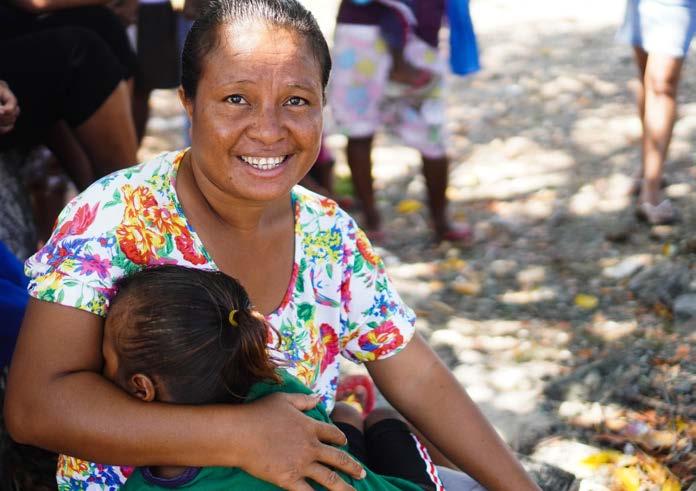TIMOR-LESTE 2021
2025
United Nations Sustainable Development Cooperation Framework
Intended development results
Policy and institutional framework for decent work and productive employment
Focusing on the policies, institutional framework, incentives and investments needed to transform the economy and develop sustainable pathways, the UNSDCF will contribute to diversifying the economy, creating decent jobs and including the marginalized active population, in particular youth and women, in a sustainable and just economy.
Robust laws and evidence-based policies and regulations are essential to support and incentivize investments in sustainable, labour-intensive economic sectors. At the same time, such laws, policies and regulations must ensure workers’ rights and guarantee the participation of all groups of the population in the labour market and the economy, in particular the more marginalized, such as women, youth and persons with disabilities. This must include: • The development and efficient implementation of enabling legislation, policies and institutional frameworks;
Partners Government
Secretary of State for Vocational Training and Employment, Ministry of Finance, Ministry of Social Solidarity and Inclusion, Ministry of Education, Youth and Sport, Central Bank
UN
ESCAP, ILO, IOM, UNCDF, UNDP, UNESCO, UNICEF, UNIDO, UN Women
Other
CCI-TL, KS-TL, bilateral partners, the EU, World Bank, ADB, IADE, Don Bosco, private providers of technical and vocational training, financial institutions, others
Theory of change underpinning Outcome 2
• Ensuring that policies focus on groups facing greater barriers to access to the labour market and decent work – namely, young people, women, persons with disabilities and migrants – both by taking into account the specificities of the barriers facing each group and by ensuring conditions and incentives are in place that allow such barriers to be overcome in order to ensure equality of opportunity for all; and • Establishment of a transparent and efficient legal and regulatory framework and stronger judicial institutions to support contract enforcement and standardized certification in order to promote business creation and growth. Business environment While laws, policies and regulations are updated and strengthened, conditions must be in place to facilitate investment and enterprise creation in strategic sectors, particularly in rural areas and in the circular economy. This can be ensured through the provision of services and through incentives for business creation, resilience and growth, in particular for the most excluded (women, youth, persons with disabilities, migrants and rural populations). This includes guaranteeing the efficiency and sustainability of public expenditure; the removal of barriers to efficient business creation, operations and growth; the provision of business support services; the development of infrastructure (road connections, internet connectivity, clean energy in remote communities); and improved access to finance.
Institutional regulatory and policy frameworks for business environment and strengthened labour rights
HUMAN CAPITAL/ECONOMIC GROWTH/POVERTY REDUCTION
Sustainable Economic Opportunities and Decent Work for All Life-long learning, competencies and skills development
• The promotion of environmentally sustainable and inclusive strategic sectors, which can stimulate value addition, support economic diversification and help ease trade imbalances, in particular in the agriculture sector (where most Timorese are currently informally employed), as well as other sectors where Timor-Leste has a comparative advantage, such as small-scale manufacturing and tourism;
Services to small and medium enterprises are of particular relevance. Specifically, entrepreneurship and selfemployment opportunities need to be increased and strengthened, through:
• Economic diversification
• Youth entrepreneurship programmes and vocational training hubs;
• Decent employment
• Provision of job counselling and mentoring services, with a specific focus and tailored to groups that encounter more barriers to entrepreneurship (such as women and youth);
• Skilled workforce
Conditions and incentives for diversified and sustainable entrepreneurship and private sector growth
• Support to integration in global value chains for companies in specific sectors; • Promotion of innovation and experimentation using business incubators (such as the recently established Accelerator Lab); • Promotion of the growth of the circular economy; • Leveraging diaspora investments, in particular in rural areas; • Expansion and eased access to finance; and
Limited access to sustainable economic opportunities and decent work in Timor-Leste, in particular for young people and women, is intrinsically linked into the lack of a diversified economy. The transformation necessary to develop sustainable economic pathways for decent work requires a combination of adequate laws, policies and regulatory framework. Developing critical incentives and conditions (including physical and financial infrastructure) is vital to the emergence of adequate business ecosystems. Developing skills sets and knowledge is also needed to leverage opportunities, to meet global trends on skills demanded and to increase productivity.
36
• Promotion of the resilience of business to negative shocks (such as decreases in public expenditure or droughts) through support to programmes and regulations. Skills development Well-developed education and training systems are essential for the Timorese people to develop the necessary skills set and knowledge to engage in wage employment or become successful entrepreneurs. According
37





